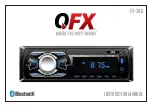
- 2 7 -
LFO
Line Feed Off
Disables line feed after the carriage return (no line feed is sent after each card is read).
LF1
Line Feed On
Enables transmission of a line feed character (ASCII code 10) following the carriage return.
ST0
Unit Status is not returned with data.
ST1
Unit Status is returned with data.
ATN
ATteNtion
Causes the Card Reader LOAD ATTENTION lamp to flash. The unit will stop reading cards once
the current card is read.
LOD
LOaD Attention
Causes the LOAD ATTENTION lamp to light. If a LOD command is sent and cards are in the
hopper, the Card Reader will ignore the command.
RES
RESet Unit
Resets the Card Reader to the following default operating parameters: Continuous Feed, Eight Bits,
Parity Off, One Stop Bit, LF Off, Echo Off, ASCII Mode, and Status Off. If a card read
operation is in progress, this command will not be executed until it is completed. Any commands that
follow the RES in a command string will not be lost.
Hexadecimal Commands
l l
XON
The CR-510 supports the XON/XOFF protocol. The hexadecimal value 11 is the XON ASCII
character. An XON command is the only command that will allow card data transmission to resume
once an XOFF command has been issued.
13
XOFF
The Hexadecimal value 13 is the XOFF ASCII character. The XOFF command will cause an
immediate interruption in the transmission of data from the CR-510 to the computer.
13 14
Clear and Reset
The Hexadecimal value 13 followed by a Hex 14 will cause the unit to clear all error conditions and
reset to the following default operation parameters: Demand Feed, Eight Bits, Parity Off, One
Stop Bit, LF Off, Echo Off, ASCII Mode and Status Off. If a card read operation is in progress, this
command will terminate it immediately (a hard reset). All commands and data resident in the
CR-510 memory prior to receipt of the Hard Reset will be flushed. (Also, referred to as DC3 and DC4.)
Summary of Contents for TRS-80 CR-510
Page 1: ......
Page 8: ......
Page 12: ...Figure 7 Baud Rate Switch Positions...
Page 17: ...Figure 10 Card Specifications Chart 1 3...
Page 24: ...20...
Page 34: ...30...
Page 39: ...35...
Page 40: ...36...
Page 41: ...37...
Page 42: ...38...
Page 43: ...39...
Page 44: ...40...
Page 45: ...4 1...
Page 46: ...42...
Page 47: ...43...
Page 48: ...44...
Page 51: ...A 1...
Page 52: ...A 2...
Page 53: ...A 3...
Page 54: ...A 4...
Page 55: ...B 1 Figure B1 General Purpose Card Appendix B Card Specification...
Page 56: ...B2...
Page 58: ...C2...
Page 60: ...D 2 Card Trailing Edge Card Must Be Placed Face Down In the Card Hopper Card Left Card Right...
Page 63: ......
















































